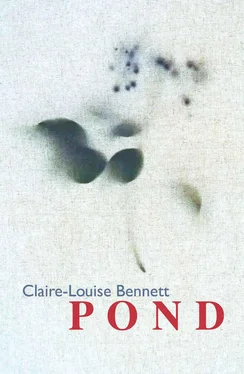Carry on with what? Well, for your information, there are always things that must be done — this, for one thing, after the fire has been lit of course. The birds need feeding at least once a day this time of year. And after a while I make the bed. I go up the steps and take a look in the post box. I like a coffee first thing. Sometimes I have a banana along with it. Sometimes that’s all I need. And the blue bowl gets emptied, or not, into the compost bin. And the enamel bucket taken without fail to the side of the cottage and filled up with coal again and again. And because there is no step everything gets in here so there is never a time when the floor couldn’t do with a good sweep. And of course there is always something to fold.
I texted the man, whose estranged wife is a very dear friend of mine, and asked him if he’d fallen asleep — I really couldn’t think what else might have happened to him. He texted back right away to say he was en route. He brought a bag of wood with him that had come from trees in his own garden and a bottle of wine that came from the country where his estranged wife — my dear friend — now lives. It was a wine I was familiar with and it was jarring, sort of, to drink it here, at this time, without her. The Japanese frames and their pared back interiors were in a large cotton bag which he leant against the ottoman beneath the mirror. I did not go near the bag and perhaps he supposed I had no real interest in the contents but I didn’t want to look at the pieces in front of him, I wanted to be alone, because in that way I wouldn’t have to come up with something to say about them. Quite often, in circumstances such as these, when an impression is proffered for the benefit of the person looming nearby, whatever is said is rarely anything at all evocative and the moment it is said something intrinsic is circumvented and cannot be recaptured later on. Anyhow, I didn’t mind waiting— waiting was a pleasure in fact. Anticipation, when it occurs, often makes me animated and expansive, as if I am perhaps reviving and honing my senses in preparation for the awaited object: yes indeed, the world is a scintillant and fascinating place when a half-remembered mystery leans within reach. He stayed for an hour and we talked about the three sons and renting apartments abroad and the recent success of a mutual friend and now and then he expressed deliberately autocratic views in order to rile me but in fact he was wasting his time because I could not be offended — on the contrary, I found a great deal to be amused by, and it might be that my irreverent attitude threw him; some people would much rather make you cross it seems. We may have mentioned Christmas, I do not recall. Even after he left I did not go to the bag directly — I took his emptied glass and the wine cooler out to the kitchen, I arranged the wood he’d kindly given me, I hung up a coat — the wine you see had gone gallivanting through my blood and I didn’t want to come at the pictures with a giddy head full of fanciful expectation. So I waited a while longer, until a more subdued atmosphere was restored, and then I went to the bag and lifted out the heavy frames; focused and unfazed — like a connoisseur.
There are six and a half small flowers. Their petals are small and heart-shaped. Scattered about them are individual petals, these are not heart-shaped and they are slightly darker, as if falling further away. A pair of hands reaches up to the flowers, just the outline of a pair of hands and the edge of one sleeve of a kimono. There is a face, turned, not looking up towards the hands, not at all concerned with the hands’ activity: the forehead, the heavy eyelids, the pursed lips, and an earring. All of this occurs in just one small diagonal area of the cloth, the rest is in blackness. And it is the same face in the second frame, where there are even fewer stitches. And while I look at this downcast profile and the few vertical lines which denote, again, the fabric of a heavy kimono, I realise I was quite wrong. Nothing had been undone; there hasn’t ever been more than this. What I saw, what I can still see when I stand close enough, was the idea — the plan — of course! Whoever created these did not remove stitches with the intention, as I had initially suspected, of beginning again; they’d simply stopped what they were doing. They did not feel obliged to complete the plan and so they did not complete the plan. Just this, just these few details showed enough. And they must have really felt that and been quite satisfied with it, because why else would they have put these two dark fragments into such beautiful frames?
I’ve put them on the mantelpiece — you could say they’ve been given pride of place. They are close to one another but not exactly side by side: they are related, but they aren’t a pair. Some people don’t notice them at all and other people are instantly intrigued by them, in which case I go into the kitchen so they have every opportunity to become utterly absorbed without feeling obliged to talk about it, which would spoil everything. Yes, I could stand in the kitchen maybe and keep an eye on things from there and perhaps one day my heart by then will be right up in the roof of my mouth as I feel someone becoming more and more taken in until finally they call out to me, excited and amazed, and say, ‘Look at that — she’s been holding a parasol all along!’
There were so many flowers already in bloom when I moved in: wisteria, fuchsia, roses, golden chain, and many other kinds of flowering trees and shrubs I do not know the names of— many of them wild — and all in great abundance. The sun shone most days so naturally I spent most days out the front there, padding in and out all day long, and the air was absolutely buzzing with so many different species of bee and wasp, butterfly, dragonfly, and birds, so many birds, and all of them so busy. Everything: every plant, every flower, every bird, every insect, just getting on with it. In the mornings I flitted about my cottage, taking crockery out of the plate rack and organising it into jaunty stacks along the window ledge, slicing peaches and chopping hazelnuts, folding back the quilt and smoothing down the sheet, watering plants, cleaning mirrors, sweeping floors, polishing glasses, folding clothes, wiping casements, slicing tomatoes, chopping spring onions. And then, after lunch, I’d take a blanket up to the top garden and I’d lie down under the trees in the top garden and listen to things.
I would listen to a small beetle skirting the hairline across my forehead. I would listen to a spider coming through the grass towards the blanket. I’d listen to a squabbling pair of blue tits see-sawing behind me. I’d listen to the woodpigeon’s wings whack through the middle branches of an ivy-clad beech tree and the starlings on the wires overhead, and the seagulls and swifts much higher still. And each sound was a rung that took me further upwards, and in this way it was possible for me to get up really high, to climb up past the clouds, towards a bird-like exuberance, where there is nothing at all but continuous light and acres of blue. Later on, towards evening, as it got cooler, I would snuggle into myself a little more and listen less and less so that, very slowly, I returned to dusk and earth. And then I’d soon begin to feel very hungry indeed so I’d sling the blanket across one shoulder and head back up to the cottage to start dinner. Which would frequently involve broad beans, lemons, perhaps some spinach, and plenty of chopped walnuts and white cheese.
Chopping.
Morning, noon and night, it seems.
How I love to chop.
Within these deep stone walls the sound of a large knife pounding against the chopping board is often mellow and euphonious; like a lulling chant it charms and placates me. Other times, late evening especially, the blade’s keen reverberation is more rugged and insistent and I have to make a concerted effort to keep my eyes down and my hands steady. I go on with my guillotining and methodically pare down this robust gathering of swanky solanums until they lose colour. Chopping, taking it all to pieces, in a kind of contracted stupor, morning, noon and night; trying not to pay any heed to my reflection in the mirror as I do so. I can’t stand that — above all I can’t stand to see the reflection of my waist, winding back and forth, there in the mirror just to my right — looking as if it might take flight when I know very well it can’t.
Читать дальше












